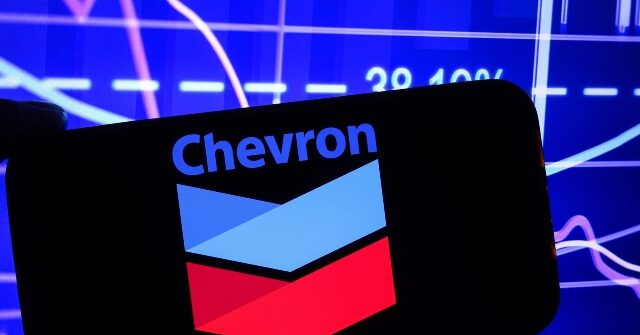California-based company Chevron filed tax returns worth about $300 million to the Venezuelan socialist regime, raising questions about how much dictator Nicolás Maduro benefits from Chevron’s oil production despite existing oil sanctions, Bloomberg reported on Thursday.
The United States, under the first administration of President-elect Donald Trump, imposed sanctions on Venezuela’s state oil company PDVSA in 2019 in response to the numerous — and ongoing — human rights violations by the Maduro regime against its own people. The sanctions deprived the socialist regime and its repressive apparatus from its main source of income.
In November 2022, the administration of outgoing U.S. President Joe Biden issued a presently active license to Chevron that allows the company to resume oil production in Venezuela and sell Venezuelan oil in U.S. markets.
Bloomberg claimed to obtain documents showing that Chevron’s ventures in Venezuela generated 8.1 million bolivars for Venezuela’s SENIAT revenue service in March 2024. The SENIAT tax submissions, according to Bloomberg, stated that Chevron’s Petropiar joint venture filed the equivalent of about $217 million in income tax in 2023, while Petroboscan, another of Chevron’s joint ventures, filed for $83 million. The report pointed out that Venezuelan laws compel companies to pay a third of their production in royalties, as well as other taxes.
Bloomberg stated in its report that it is “unclear if, or how, Chevron paid those taxes,” as any form of payment to the Maduro regime would appear to be in violation of the terms of the license to operate in Venezuela. That license prohibits the company from paying taxes, royalties, or dividends of any kind to Venezuela’s state-owned oil company PDVSA or any state entity.
“Chevron conducts its business in Venezuela in compliance with all applicable laws and regulations,” Chevron spokesman Bill Turenne told Bloomberg on Thursday.
Bloomberg stated in its report that Chevron’s relationship with Venezuela is likely to come under intense scrutiny in the second Trump administration. Trump is expected to take “a harder line against the Maduro regime than Joe Biden’s administration.”
The outlet highlighted that President Biden issued the license to Chevron at a time when representatives of the Maduro regime and the Venezuelan “opposition” Unitary Platform were holding talks to organize a “free and fair” election in Venezuela and when the United States “was in the midst of decades-high inflation at the time, driven in part by high oil prices.”
The U.S. Department of the Treasury stated in November 2022 that the license reflected the United States’ policy to provide sanctions relief based on “concrete steps that alleviate the suffering of the Venezuelan people and support the restoration of democracy.” At press time, no such free and fair election has taken place in Venezuela. Nicolás Maduro was sworn in for a third fraudulently obtained six-year term on January 10 after “winning” a sham presidential election on July 28.
“Chevron is not just enabling oppression; it is profiting from it,” Rep. Maria Elvira Salazar (R-FL), told Bloomberg’s Latin American branch via email. “Their licenses need to go away.”
During his confirmation hearing in Congress to become secretary of state, Sen. Marco Rubio (R-FL) said that the United States should reconsider Chevron’s license to operate in Venezuela and asserted that the Biden administration “got played” by Nicolás Maduro’s promises of holding a “free election” in exchange for oil sanctions relief.
“Now they have these general licenses where companies like Chevron are actually providing billions of dollars of money into the regime’s coffers, and the regime kept none of the promises that they made,” Rubio said. “So all that needs to be re-explored.”
In October 2023, President Biden awarded the Maduro regime a generous six-month oil and gas sanctions relief package that temporarily restored the Maduro regime’s main source of revenue in exchange for yet another series of vague promises towards holding a “free and fair” election in Venezuela. Maduro did not uphold the terms of the agreement, completely trashed it, and replaced it with a tailor-made election deal leading to the fraudulent July 28 presidential election.
Christian K. Caruzo is a Venezuelan writer and documents life under socialism. You can follow him on Twitter here.
Read the full article here
